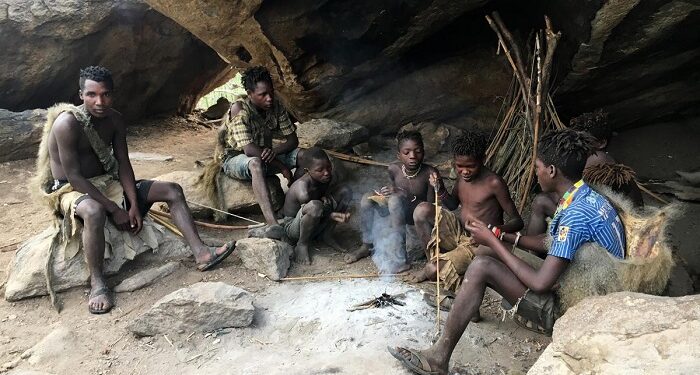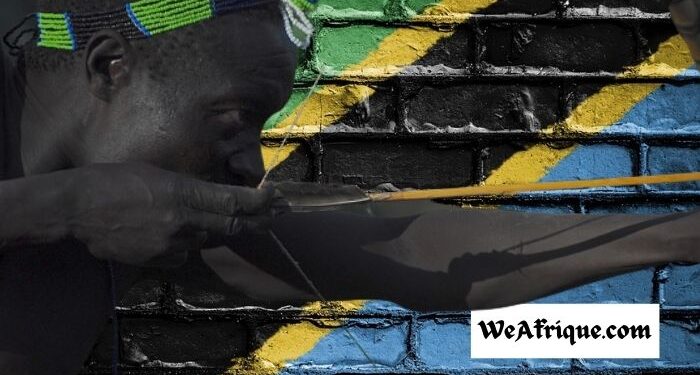- The Hadza tribe is a Tanzanian ethnic group whose language is entirely oral and unrelated to other tribes
- The tribesmen still maintain their ancestor’s lifestyle but are now threatened by western influences
- The hunter-gatherer tribe does not believe in any divinity and does not have any form of social obligation
The Hadza tribe is a modern hunter-gatherer people found in northern Tanzania. With a population of about 1,300, the people are regarded as one of the last remaining hunter-gather tribes on Earth.
Also known as Hadzade, the Tanzanians have a peculiar lifestyle that has remained the same for several years. Their kind lifestyle and customs have not undergone changes despite western influences.
With a highly conservative way of life, the Hadza tribe is not closely related to any other tribe or people. However, their language, Hadza was once classified as a Khoisan language. It was later thought to be isolated and unrelated to any other language. The language is an entirely oral language. Aside from their mother tongue, some Hadza have adopted Swahili as a second language.
Brief History and Language of the Hadza Tribe

The Hadza tribe is a native ethnic group located in the southwest Karatu District of the Arusha Region. They lived around Lake Eyasi in the central rift valley and also in the neighboring Serengeti Plateau.
They are the descendants of Tanzania’s aboriginal, pre-Bantu expansion hunter-gatherer population. The Hadzas still pursue almost the same lifestyle as their ancestors did in the early 20th century.
Research has shown that the Hadza tribe is closely related to any other tribe. Their language used to be classified among the Khoisan language but it is now said to be isolate, which means the language is unrelated to any other.
Although the language is an oral language, the tribesmen often use that language to distinguish their people from outsiders. However, recently, the Hadza people have learned Swahili, which is the national language of Tanzania as their second language.
Today less than 1300 people speak Hadzane although and the number of fluent speakers keeps declining.
The Culture and Traditions of the Hadza People
Hadza’s oral history is divided into four epochs. Each epoch is told ascribed to a different culture. The Hadza’s tradition posited that at the beginning of time, the world was inhabited by hairy giants called the ‘akakaanebee’ which translates to ‘first ones’ or ‘geranebee’ ancient ones.
According to the second account, the ‘akakaanebee’ were succeeded by the ‘xhaaxhaanebee'(in between ones) who were also gigantic but not hairy. These giants lived in caves and were the first in Hadza’s history to use medicines and charms to protect themselves from enemies.
The third Epoch was inhabited by the people of ‘hamakwanebee'(recent days). They were smaller than their predecessors, the ‘xhaaxhaanebee’. They invented bows and arrows and also invented gambling among other things.
The Hadza people are in the fourth epoch. The inhabitants are called ‘hamayishonebee'(those of today).
The Hadza territory has been threatened in recent years due to increasing encroachment from neighboring tribes. Nevertheless, the Hadza people have no permanent settlement. Once they camp in a particular place, they create temporary settlements and shelters with dried grasses and branches.
Read Also: Himba Tribe: The Truth About This Tribe, Their Traditions And Culture
The Hadza Tribe is Monogamous
In the culture of the Hadza people, there is no social enforcement of monogamy on the Hadza people. Also, there is no marriage ceremony as a couple is declared married after spending several nights together at a fireplace.
After the marriage, the husband and wife are allowed to live anywhere they chose. That can be either with the father’s family or the mother’s. Reports have shown that most Hadza couple tends to live with the mother’s kin rather than the father’s kin.
Before marriage, there are traits that Hadza men and women sometimes look out for in a partner. Some of the traits include physical attractiveness, averageness, and also sexually dimorphic voice pitch.
In the past, Hadza women married into other groups like the Bantu Isanzu but the marriage did not last so they returned to the Hadza community.
Childbirth
It has been speculated that childbirth in the Hadza community is rather odd. The women simply give birth by squatting in the bushes. For that reason, life expectancy is very low within them. Research has shown that most Hadza babies hardly survive their first year and very few make it to age 15.
Due to extreme heat and frequent thirst, the babies hardly survive. Those that survive later get infected by tsetse flies and mosquitoes.
The Hadza People Call Men ‘Epeme’
Apparently, Hadzane refers to adult men as epeme. However, are certain things the man must do before he is called an epeme. A tribesman becomes an epeme in his early 20s by killing large game.
As an ‘epeme’, the men are permitted to eat certain parts of large animals like giraffes, wildebeest, lions, and buffalo. The men are made to eat only some of the parts of the animals. Some of the parts include the kidney, neck, genitals, and heart. Doing the meat-eating, non-epeme men are not allowed to be present.
Aside from the meat, the ‘epeme’ men also take part in an ‘epeme’ dance. The dance takes place every night when the moon is not visible and it must take place in complete darkness. The man dances wearing an ostrich-feather headdress, a black cape with bells around the ankles.
Religious Beliefs
Unlike many African tribes, the Hadzado does not have any belief as regards the afterlife. They do not believe in any divinity but believe in a presence that manifests itself in the sun. However, they practice their ancestors’ worship and believe in their presence in the form of ghosts.
For that reason, people do not have religious rituals.
Similarly, they do not have any form of social obligations even funerals. In the Hadza community, corpses are sometimes buried or left in the open for hyenas to eat. Once a person dies, they change their camp.
Dressing Style
The Hadza women are known own for wearing pieces of clothes in form of skirts. These are made from the soft skins of the female impala. They decorate their clothes with beads, bells, and cowrie shells. Young Hadza men and boys wear skins of animals in form of loincloth.
The Hadza People Have a Healthy Diet
They do not grow or store their food. They only survive by hunting food stuff by using handmade bows. Their diet has been considered very healthy since it is mainly organic and natural. Their diet is primarily plant-based and so contains high levels of fiber and phytochemicals. This is said to be the reason why the Hadza experience almost no autoimmune diseases, obesity, diabetes, colon cancer, and other chronic diseases.
The Hadza adjust their diet based on the season and circumstance. Also, their location sometimes determines what they will feed on.
There is a division of labor among the Hadza men and women. While men specialize in hunting meat and honey their women gather honey and other small animal or egg. It is worthy of note that the Hadza people retire from their assigned responsibilities. The men retire from hunting at the age of 45. However, they do not stop carrying their bows and arrows for safety.
Aside from hunting, the Hadza engage in gathering activities a lot. This is usually taught from childhood.
While many westernized diets are low in phytochemicals and have high levels of sugars and unhealthy fats, most of the Hadza foods contain the exact opposite.
The Myth about the Relationship Between the Hadza People and a Wild Bird
There is a myth about the relationship between a wild bird and the Hadzane. It is believed that the bird guided the people to wild bees to harvest honey. The men, who harvest the honey are always very attentive to the bird’s chatter.
Once the honey-hunter has located the bee nest, the hunter uses smoke to subdue the bees and axe it down. In other to attract the honeyguide in the future, the Hadza hunter burn or bury the remains in order to keep the honeyguide hungry.
It is known that Honey is a significant part of the Hadza diet.
The Hadza tribe is a relatively small ethnic group yet the people are widely known for maintaining the same kind of lifestyle as their ancestors did. While their language is still considered isolated, it is possible that the hunter-gatherer tribe would soon come in contact with other tribes due to constant movement and intermarriage. In the wake of civilization and westernization, the culture and traditions are of the Hadza tribe threatened. Also, the increasing rate of tourist visits and encroaching pastoralists might also threaten their traditional way of life.





















Discussion about this post